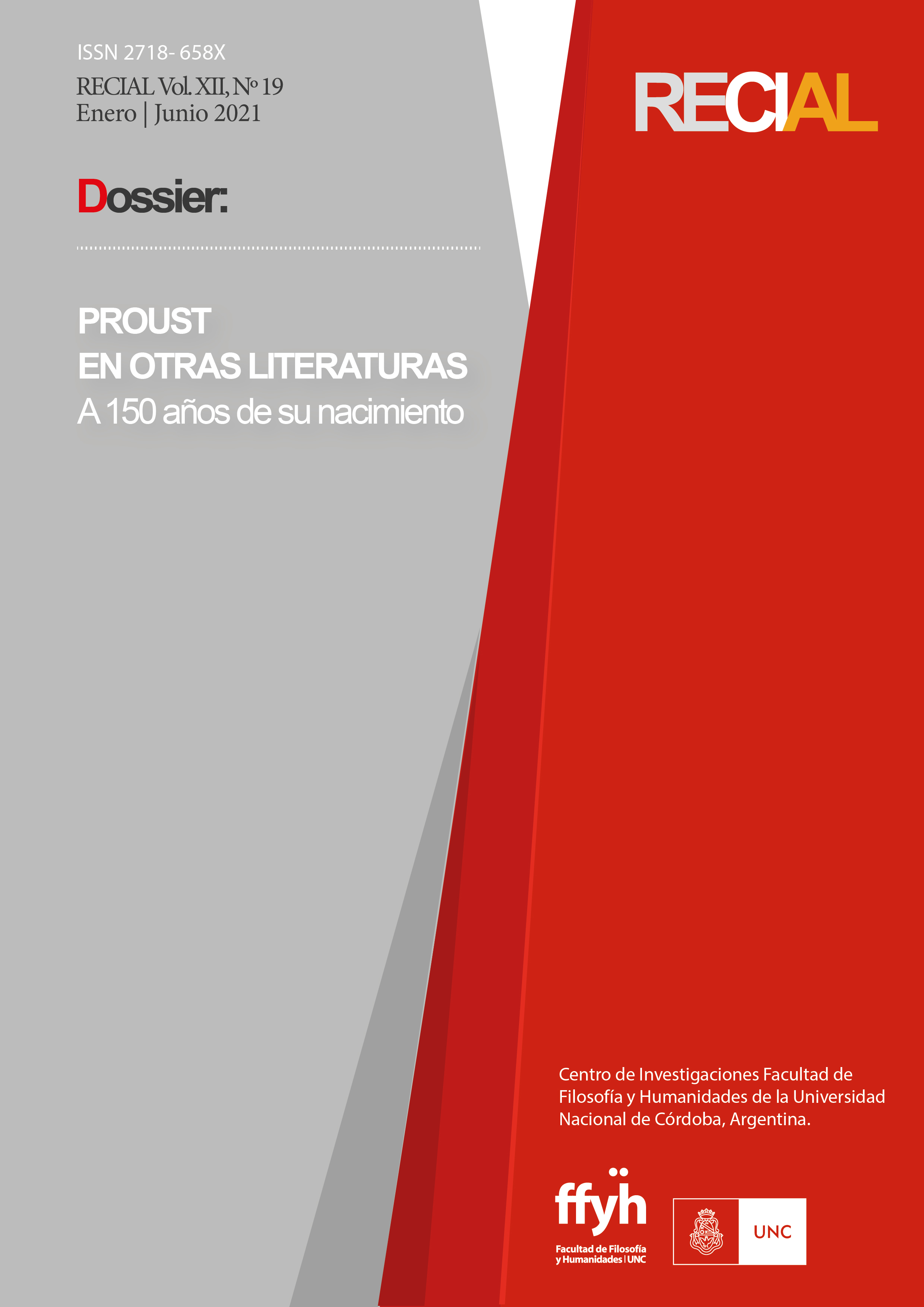Vinteuil’s shadow in two french novels
DOI:
https://doi.org/10.53971/2718.658x.v12.n19.33837Keywords:
Bastianelli, composer, literature, Millet, VinteuilAbstract
This article of comparative literature investigates the post-Vinteuil period by analyzing the reception of the fictitious composer of Marcel Proust's work In Search of Lost Time in literary writings from the second half of the 20th century as well as from the 21st century. These novels staging the composer fit into a relatively recent (late 18th century) sub-category of fiction: stories about composers who only exist in the pages of books. The second half of the 20th century ushered in a change in the way novelists described fictional composers: a burlesque vein emerged which did not escape some Proustian novels. The shadow of Vinteuil can explain the need, with various stakes, for this parodic turn: some authors, such as Richard Millet in L'Angélus, are aware that they must literally put to death the master, Proust, in order to free themselves from him –even if his legacy lives on. Others, like Jérôme Bastianelli in La Vraie Vie de Vinteuil, ambition to make Vinteuil real: although they actually create a new character who is all the more fictitious for that matter.
Downloads
References
Bastianelli, J. (2019). La Vraie vie de Vinteuil. París: Grasset.
Defer, D. (1992). À la Recherche du temps perdu : une œuvre ouverte? Bulletin Marcel Proust, 42, 108-116.
Eco, U. (1965). L’œuvre ouverte, París: Seuil.
Eco, U. (1 de junio de 2010). Quelques commentaires sur les personnages de fiction. SociologieS. Recuperado de http://journals.openedition.org/sociologies/3141
Giesbert, F.-O. (24 de agosto de 2006). Richard Millet: L'Angélus de Millet. Le Point, 1771, 82-83.
Hara, S. (1996). Le ton de la musique de Vinteuil: fa dièse. Bulletin Marcel Proust, 46, 30 46.
Leblanc, C. (2017). Proust écrivain de la musique, L'allégresse du compositeur. Turnhout: Brepols.
Locatelli, A. (2001). Littérature et musique au XXe siècle. París: Presses Universitaires de France.
Malinovska-Salamonova, Z. (6 de marzo de 2005). Portrait de femme chez Richard Millet. Sens public. Recuperado de http://sens-public.org/articles/168
Mauriac Dyer, N. (2013). Bidou, Bergotte, la Berma et les Ballets russes, une enquête génétique. Genesis, 36, 51-62.
Millet, R. (1988). L’Angélus. París: POL.
Millet, R. (1993). Le sentiment de la langue I, II, III. París: Éditions de la Table Ronde, La Petite Vermillon.
Proust, M. (1971). Contre Sainte-Beuve, précédé de Pastiches et mélanges et suivi de Essais et articles, édition établie par Pierre Clarac, avec la collaboration d’Yves Sandre. París: Gallimard, «Bibliothèque de La Pléiade».
Proust, M. (1987-1989). À la recherche du temps perdu (Vols. 1, 2, 3 y 4). París: Gallimard.
Proust, M. (2007). Por la parte de Swann (Trad. Carlos Manzano). Buenos Aires: Debolsillo.
Proust, M. (2009). La prisionera (Trad. Carlos Manzano). Buenos Aires: Debolsillo
Proust, M. (2010). El tiempo recobrado (Trad. Carlos Manzano). Buenos Aires: Debolsillo.
Rose, S. (2014). The Musician in Literature in the Age of Bach. Cambridge: University Press.
Ross, A. (24 de agosto de 2009). Imaginary Concerts. The New Yorker. Recuperado de https://www.newyorker.com/magazine/2009/08/24/imaginary-concerts
Stawiarski, M. (2015). L’intermédialité musico-littéraire et la notion d’excentricité. En F. Guiyoba (dir.), Littérature médiagénique : Écriture, musique et arts visuels (pp. 15 50). París: L’Harmattan.
Downloads
Published
Issue
Section
License

This work is licensed under a Creative Commons Attribution-NonCommercial-ShareAlike 4.0 International License.
Aquellos/as autores/as que tengan publicaciones en esta revista, aceptan los términos siguientes:
- Los/as autores/as conservarán sus derechos de autor y garantizarán a la revista el derecho de primera publicación de su obra, el cuál estará simultáneamente sujeto a la Licencia de reconocimiento de Creative Commons que permite a terceros compartir la obra siempre que se indique su autor y su primera publicación esta revista.
- Los/as autores/as podrán adoptar otros acuerdos de licencia no exclusiva de distribución de la versión de la obra publicada (p. ej.: depositarla en un archivo telemático institucional o publicarla en un volumen monográfico) siempre que se indique la publicación inicial en esta revista.
- Se permite y recomienda a los/as autores/as difundir su obra a través de Internet (p. ej.: en archivos telemáticos institucionales o en su página web), luego de su publicación en la revista. (Véase El efecto del acceso abierto).























